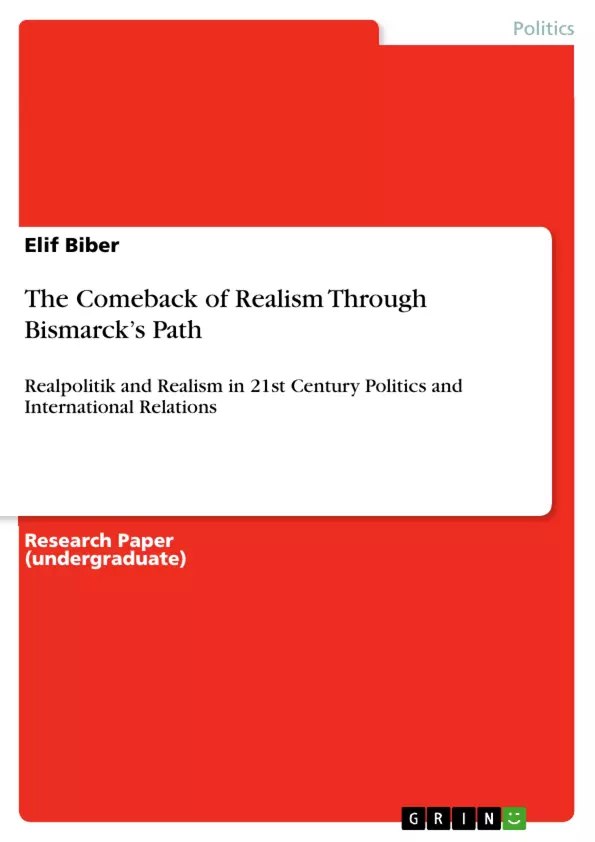Throughout history, international relations had different phases with different dominant ideologies. During the concert of Europe period, realism was the dominant ideology. Through the end of the Concert, the balance of power in Europe helped Realpolitik to flourish. After World War I, Wilsonian ideas and liberalism became the key ideology for states in both diplomatic and economic relations. If we come closer to today, during and after the Cold War period, realism and the concerns for collective security made their comeback. These two periods which were dominated by the ideology of realism had something in common and this was the importance of Bismarck's ideas about realism and his implications of realpolitik.
Inhaltsverzeichnis (Table of Contents)
- The Comeback of Realism Through Bismarck's Path: Realpolitik and Realism in 21st Century Politics and International Relations
- Otto von Bismarck: The Father of Realpolitik
- The Importance of Transparency and Flexibility
- The Legacy of Bismarck
- Realpolitik and its Implications for Modern International Relations
- The Iraq War: A Case Study in Realpolitik
- The Limits of Democracy in International Relations
- The Role of International Organizations in Global Governance
- Bismarck's Realist Approach to International Cooperation
Zielsetzung und Themenschwerpunkte (Objectives and Key Themes)
This text examines the enduring relevance of Otto von Bismarck's realpolitik in contemporary international relations. It explores how Bismarck's ideas on transparency, flexibility, and the pursuit of national interests continue to shape state behavior in the 21st century. The text also discusses the limits of liberal ideals and the importance of realism in a world characterized by power politics and national security concerns.
- The enduring relevance of Bismarck's realpolitik in modern international relations
- The importance of transparency and flexibility in interstate relations
- The interplay of realism and liberalism in international affairs
- The impact of power politics and national security on state behavior
- The role of international organizations in maintaining global stability
Zusammenfassung der Kapitel (Chapter Summaries)
The text begins by tracing the evolution of international relations throughout history, highlighting the rise and fall of different ideologies, including realism, liberalism, and collective security. It emphasizes the importance of Bismarck's ideas in shaping the concept of realpolitik during the Concert of Europe period. It then delves into Bismarck's life and career, outlining his key accomplishments and contributions to German unification and international relations.
The text continues by examining the legacy of Bismarck's policies, particularly his emphasis on transparency and flexibility in interstate relations. It contrasts his approach with the more aggressive foreign policy of post-Bismarck Germany, which ultimately led to World War I.
The text then explores the resurgence of realism in the post-Cold War era, focusing on the Iraq War as a contemporary example of realpolitik in action. It examines the motives behind the US invasion of Iraq and analyzes the implications for international security and the spread of democracy.
The text concludes by discussing the role of international organizations in managing global governance and maintaining peace. It highlights the limitations of these organizations and argues that states, particularly powerful ones, will continue to act in their own self-interest, regardless of international institutions. This conclusion underscores the enduring relevance of Bismarck's realist perspective in understanding the dynamics of international relations.
Schlüsselwörter (Keywords)
The key themes and concepts explored in this text include: realpolitik, realism, international relations, diplomacy, power politics, national security, transparency, flexibility, collective security, international organizations, the Concert of Europe, Otto von Bismarck, the Iraq War, and the limits of democracy.
Frequently Asked Questions
What is Otto von Bismarck's role in the history of Realpolitik?
Bismarck is considered the "Father of Realpolitik," emphasizing national interests, flexibility, and pragmatic diplomacy over ideological or moral considerations in international relations.
How is the Iraq War used as a case study for Realpolitik?
The text analyzes the US invasion of Iraq as a modern example where power politics and national security interests were prioritized, demonstrating the resurgence of realist principles.
What are the limits of international organizations in global governance?
Realism suggests that international organizations are limited because powerful states will ultimately act in their own self-interest, regardless of institutional rules or collective security ideals.
Why are transparency and flexibility important in Bismarck's approach?
Bismarck believed that being flexible and transparent about national interests allowed for stable alliances and prevented unnecessary conflicts that arise from rigid ideologies.
What is the main difference between realism and liberalism in this context?
Liberalism focuses on cooperation, international law, and democratic ideals, while realism (Realpolitik) focuses on power, state sovereignty, and the pragmatic pursuit of national survival.
- Quote paper
- Elif Biber (Author), 2020, The Comeback of Realism Through Bismarck’s Path, Munich, GRIN Verlag, https://www.grin.com/document/987554



